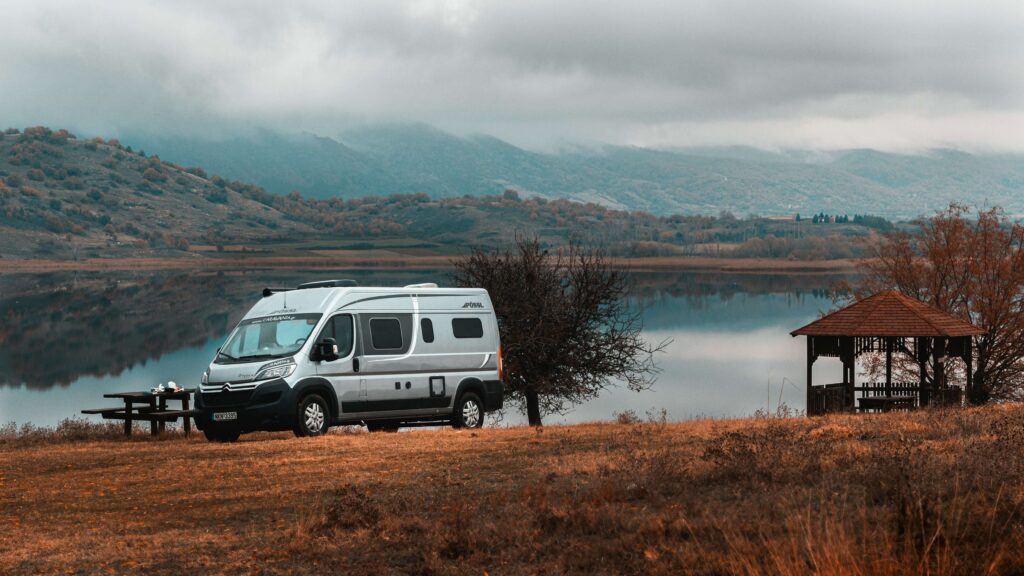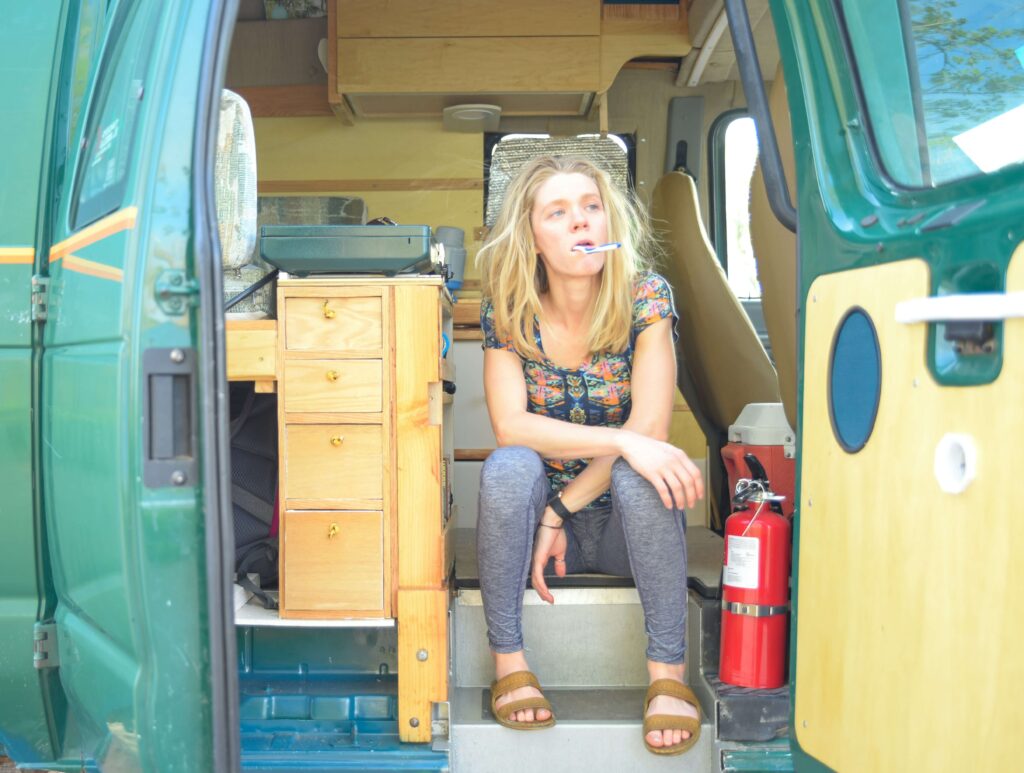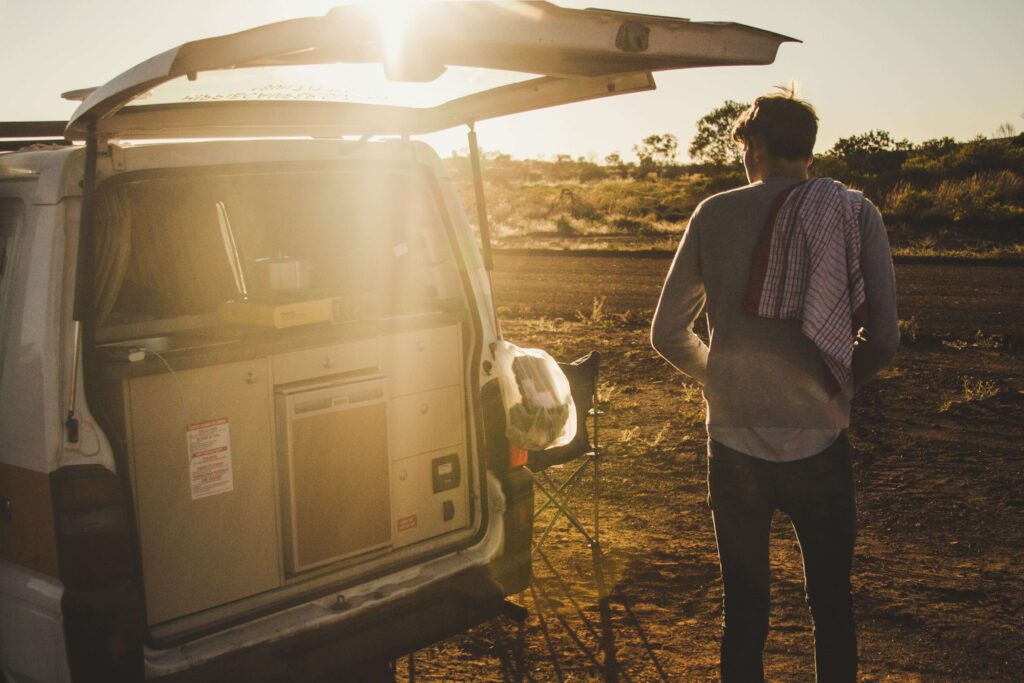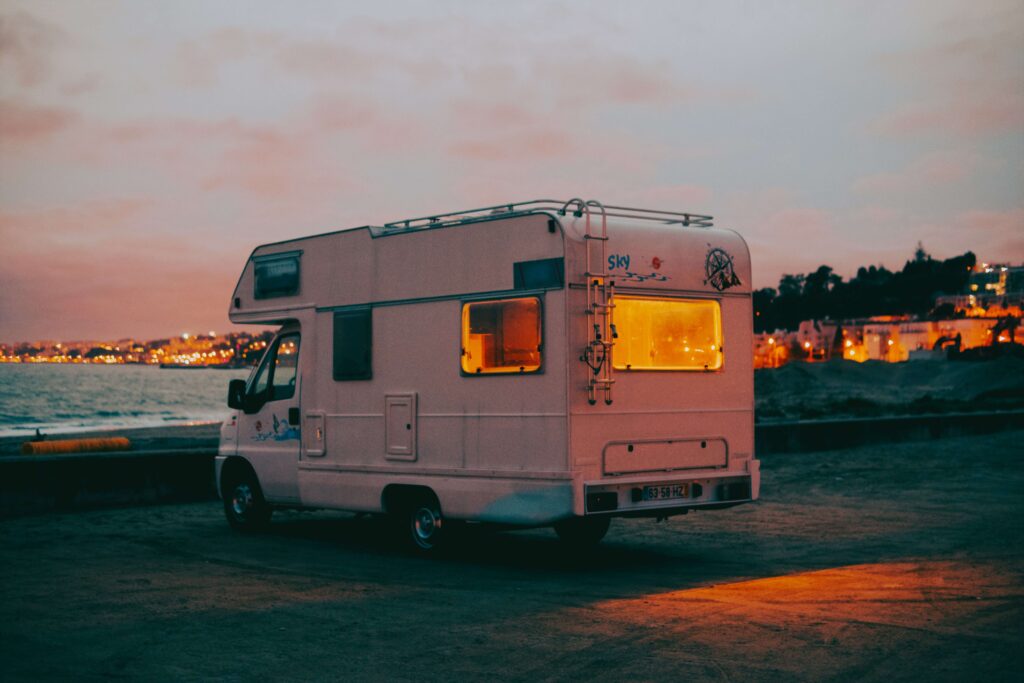Living in a Van: Uncensored UK Van Life Costs & Truths

One year ago, you were scrolling through van life hashtags during your lunch break, dreaming of morning coffee with mountain views. Now you’re standing in a Tesco car park at midnight, trying to figure out why your water pump sounds like a dying whale. Nobody warned you about this bit.
Welcome to van life – where every sunrise photo comes with a story they don’t put on Instagram, and your Volkswagen Crafter is simultaneously your kitchen, bedroom, office, and occasional nemesis.
That perfectly curated shot of artisanal coffee beside a pristine lake? It probably involved a fair trek to reach, a campsite fee, and twenty minutes hunting for phone signal to upload it. The reality behind those dreamy van life posts is a world of monthly budgets that might surprise you, bureaucratic battles, and the surprisingly complex art of emptying toilet cassettes.
But here’s the thing – it’s still brilliant. Just not for the reasons you think.
This is your honest mate’s guide to what full-time campervan living actually involves. No romantic nonsense about “finding yourself on the open road.” Just the truth: the magical sunrises and the breakdown stories, the freedom and the admin chaos, the adventure and the very real possibility that you’ll become emotionally attached to a chemical toilet.
The £1,000 Reality Check: Your Wallet’s Van Life Wake-Up Call
“Rent-free living,” they said. “Save loads of money,” they said.
“I Thought It Would Cost £500”: The Budget Breakdown Reality
“I did the maths on the back of an envelope. Big mistake.”
That napkin calculation you scribbled down during your lunch break? The one where you worked out van life would cost about £500 a month because you wouldn’t have rent? Yeah, about that. The reality is closer to £1,013 monthly, and that’s with serious penny-pinching.
Food alone runs around £220 a month, which sounds reasonable until you realise you can’t bulk-buy anything because your “pantry” is a cupboard the size of a shoebox. Those weekly Lidl shops become twice-weekly Lidl shops because you simply can’t store a month’s worth of anything. Limited storage means limited savings.
Fuel, parking, and tolls average £154 monthly. Vans don’t exactly sip fuel like a Prius – think more along the lines of 23-28 miles per gallon when loaded up. Plus, Clean Air Zone charges in cities can sting, especially if you’re driving an older diesel.
When Your House Decides to Break Down
“It was a Tuesday when the clutch gave up. Cost me £2,500 and three weeks in a Premier Inn.”
Here’s the thing about van life: when your transport breaks down, so does your house. Vehicle maintenance averages £196 monthly, but that’s just the regular stuff. The real financial shock comes when something major goes wrong.
A new cambelt? £502. Clutch replacement? £2,500. And unlike a boiler breaking in a normal house, you can’t just pop round to your mate’s for a shower while you wait for the repair man.
Smart van lifers squirrel away £200 monthly for these inevitable disasters. It’s not paranoia – it’s survival. Breakdown cover becomes essential, not optional.
Death by a Thousand Small Expenses
The £30 monthly laundry ritual might seem trivial until you’re doing it every fortnight at service stations. Water costs about £10 monthly – yes, water costs money when you’re filling up tanks rather than turning on taps.

Waste disposal? £20 monthly for the privilege of emptying your grey water and toilet cassette at designated points. Even your internet costs more – around £37 for multiple SIM cards because signal hunting becomes a professional skill.
These aren’t big numbers individually. But they add up faster than you can say “freedom from rent.”
The Address Paradox: How to Exist When You Don’t Officially Live Anywhere
Spoiler alert: The government really, really wants to know where you sleep at night.
“Sorry, What’s Your Postcode?” And Other Awkward Questions
Customer service representative: “Can you confirm your address?” You: “Well, it’s complicated…”
This conversation happens more often than you’d think. Britain’s entire administrative system is built on the assumption that everyone sleeps in the same place every night, preferably with a postcode that doesn’t change.
You’ve got options, though none of them are straightforward. Virtual address services like Van Post or Expost provide a “real street address” for about 60p a day, complete with mail forwarding and online scanning. Alternatively, your mate Dave’s spare room becomes surprisingly valuable – not for sleeping, but for official correspondence.
The DVLA, however, refuses to play ball. They demand a genuine residential address for driving licences and vehicle registration. Virtual addresses? PO Boxes? Not a chance. This means maintaining some connection to a fixed address, whether it’s family or friends, because legally speaking, your van simply doesn’t count as a home.
Banking: The Ultimate “Computer Says No” Experience
“Sir, our system requires a fixed address.” “But I don’t have one.” “Then we can’t help you.” “But – ” “Computer says no.”
Traditional banks operate like they’re still in 1995. HSBC and Lloyds offer “No Fixed Address” accounts, but there’s a catch – you need a charity referral to access them. It’s like needing a password to get into an exclusive club you didn’t know existed.
Digital banks come to the rescue. Monzo, Revolut, and Starling rely more on photo ID and biometric verification than proof of address. They’re not perfect, but they’re considerably more flexible than their brick-and-mortar cousins.
Healthcare: Your Right to GP Care (Even If Your GP Doesn’t Know It)
The NHS GP Access Card exists specifically for this situation. You have the legal right to register with a GP without proof of address – surgeries can use their own address for your registration.
The Mobile Office: Working From Everywhere and Nowhere
Your commute is now measured in signal bars, not minutes.
WiFi Roulette: The Great British Signal Hunt
“I’ve had video calls from Asda car parks, McDonald’s, and once memorably, while parked outside a dog grooming salon in Carlisle.”
Your van is basically a mobile Faraday cage. That decent 4G signal you had outside? It drops to nothing the moment you climb inside your metal box. Even in areas with solid coverage, the van itself blocks enough signal to make video calls an exercise in frustration.
External antennas become essential kit – roof-mounted salvation that bypasses your van’s signal-blocking properties. EE typically offers the best UK coverage, crucial when you’re working from remote locations where “no signal” isn’t just inconvenient, it’s career-threatening.
But even with the best setup, you’ll find yourself playing network roulette. Swapping SIM cards, switching between 3G and 4G, hunting for different cell towers. Signal hunting becomes a professional skill.
“Where Are You Calling From?” Career Adventures on Four Wheels
When your background noise includes seagulls, explaining your location becomes an art form. Remote work meets ultimate remote location, and suddenly “working from home” takes on a whole new meaning.

Mental Health in a Metal Box
Creating boundaries when your bedroom is your office is your kitchen requires serious mental gymnastics. Some van lifers pack away all work gear at day’s end, creating physical separation in a space where privacy doesn’t exist.
The surprisingly therapeutic art of grey water management provides natural work breaks. There’s something oddly satisfying about emptying tanks and refilling water – it forces you outside and away from screens.
Noise-cancelling headphones become essential kit, not just for calls but for sanity. When your office walls are measured in millimeters rather than meters, blocking out external noise – and creating your own acoustic bubble – becomes crucial for maintaining focus.
The Trade-Off Truth: What You Gain, What You Lose, What You Never Expected
Every perfect sunset comes with a corresponding bathroom logistics challenge.
The Van Life Tribe: Instant Friends and Suspicious Locals
“We broke down outside Penrith. Within an hour, three other van lifers had stopped to help. Try getting that level of community spirit on your suburban street.”
The unspoken campervan solidarity code is real. Spot another van with its bonnet up and you stop. No questions asked. This instant brotherhood extends beyond breakdowns – shared tips about wild camping spots, weather warnings, even borrowing tools from complete strangers.
Facebook groups become your new village. Apps like Park4Night connect you with fellow nomads, creating meetups that feel more like family reunions than chance encounters.
But there’s a flip side. The “dirty traveller” stare from locals is unfortunately common. Dog walkers cross the street, car horns honk at unreasonable hours, and general suspicion follows you regardless of how tidy or respectful you are.
Going Green? It’s Complicated
Smaller home, bigger fuel bill – the environmental maths don’t always add up. Your living space might be compact, but if you’re constantly moving, the carbon footprint can be substantial.
You’ll become a master of single-portion shopping. Limited storage means frequent trips to shops, buying individual items instead of bulk purchasing. The guilt of individual yogurt pots adds up, both environmentally and financially.
Daily Life Reimagined: The Toilet Paper Chronicles
When your loo needs more planning than your route, daily life takes on new dimensions. Toilet cassettes require emptying every few days, grey water needs designated disposal points, and fresh water becomes a precious commodity.
The great shower hunt makes gym memberships essential. Storage Tetris reaches extreme levels – every item needs a designated place, and clutter becomes your enemy.
“Popping to the shops” becomes a military operation. You can’t just nip out – everything needs securing, routes need planning, and parking becomes a strategic consideration. The spontaneity you imagined? It comes with a learning curve steeper than the Scottish Highlands.
The People Factor: Family, Friends, and Fellow Road Warriors
Van life: the ultimate relationship test.
“You’re Living in a What?” Explaining Your Life Choices
Mum: “But where do you put your things?” You: “What things?” Mum: “All your things!” You: “I don’t have things anymore.” Mum: [concerned silence]
Family reactions range from worry to envy, often in the same conversation. Your sister might express concern about your “stability” while secretly wondering if you’ve cracked the code to actual freedom. Friends who consider a camping weekend “roughing it” struggle to comprehend choosing this lifestyle permanently.
The Christmas visit dilemma becomes real. Turning up in a van to park on your parents’ drive changes family dynamics. Suddenly you’re the relative who “lives in a van,” complete with all the assumptions that carries.
Instant Coffee, Instant Community
Breakdown solidarity operates better than neighbourhood watch. Fellow van lifers possess an almost supernatural ability to appear when you’re having mechanical troubles, armed with tools, knowledge, and genuine willingness to help.
The sacred car park etiquette among vanners is unspoken but understood. Respect others’ space, share information about facilities, and always wave when passing another van on the road.
Online groups vs. real-world meetups reveal the difference between digital community and physical connection. Facebook groups provide practical advice and virtual support, but nothing beats meeting fellow travellers in person. Impromptu gatherings form around scenic car parks, turning strangers into temporary neighbours sharing evening drinks and travel tales.
The van life community operates like a nomadic village where everyone looks out for each other, compensating for the isolation that constant movement can create.
Six months later, you’ve learned to love the sound of your water pump (turns out it only sounds like a dying whale when it needs descaling). You’ve mastered the art of the three-minute shower, can empty a toilet cassette without gagging, and know exactly which Tesco car parks have the best phone signal.
“Would I go back to bricks and mortar?” you wonder, sipping morning coffee while watching the sun rise over Windermere. “Ask me again when it’s January and I’m trying to de-ice my windscreen from the inside.”
The Bottom Line: Is Van Life Worth It?
Van life isn’t the Instagram dream – it’s better and worse and more real than anything social media can capture. It’s freedom with a side order of admin chaos, adventure seasoned with bureaucratic frustration, and a lifestyle that teaches you what you really need versus what you thought you wanted.

The monthly budget might shock you, the address situation will definitely frustrate you, and you’ll spend more time thinking about toilet facilities than any reasonable person should. Your family will worry, locals might judge, and your internet connection will fail at the worst possible moments.
But you’ll also wake up somewhere different every morning if you choose to. You’ll discover hidden corners of Britain that most people drive past without noticing. You’ll develop problem-solving skills that would impress a NASA engineer and form friendships with fellow travellers that transcend geographical boundaries.
The question isn’t whether van life is right or wrong. It’s whether you’re ready for a life where every day brings a new problem to solve, a new view to wake up to, and the constant reminder that the best adventures rarely go according to plan.
The pump still sounds like a dying whale sometimes. But now you know how to fix it.

